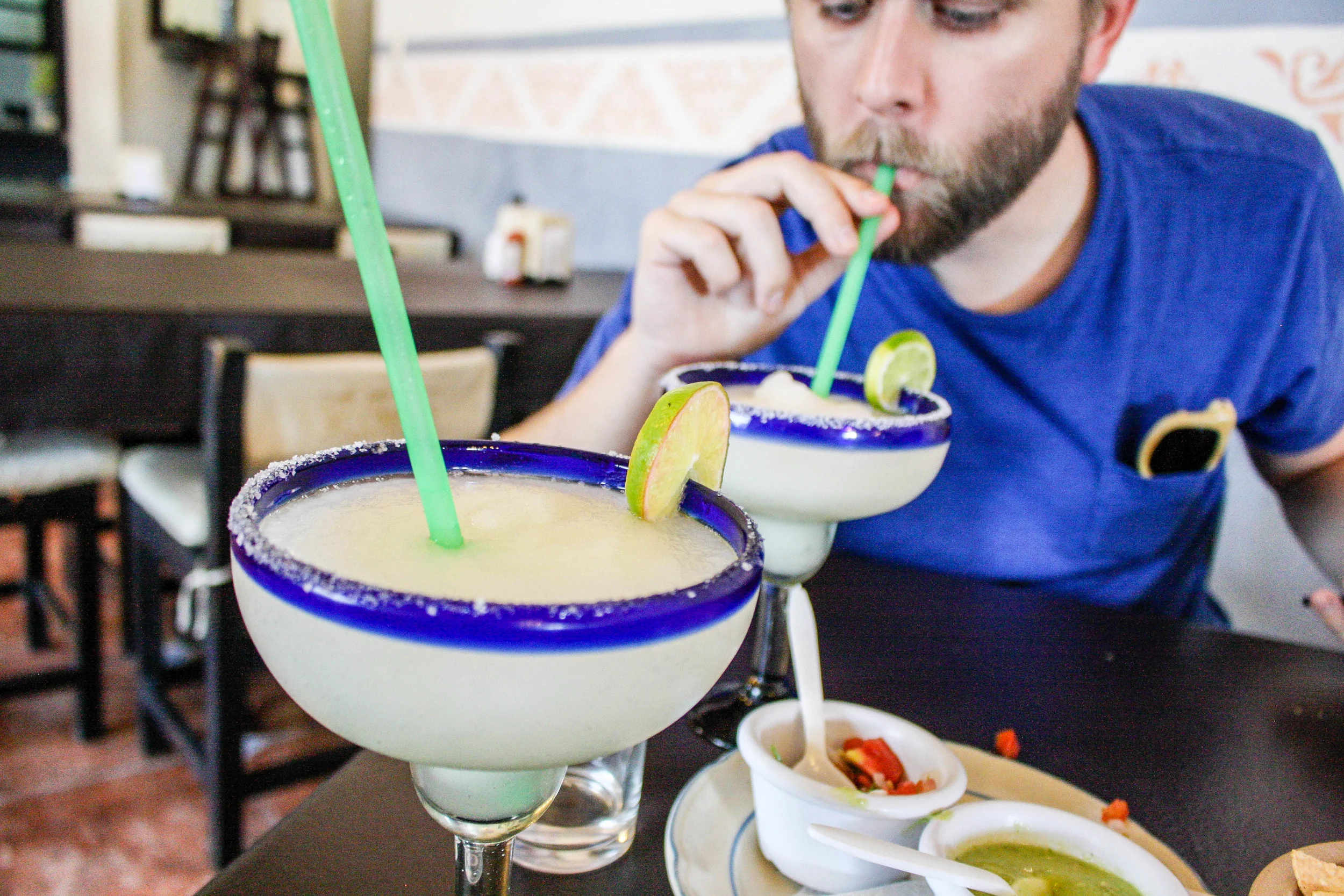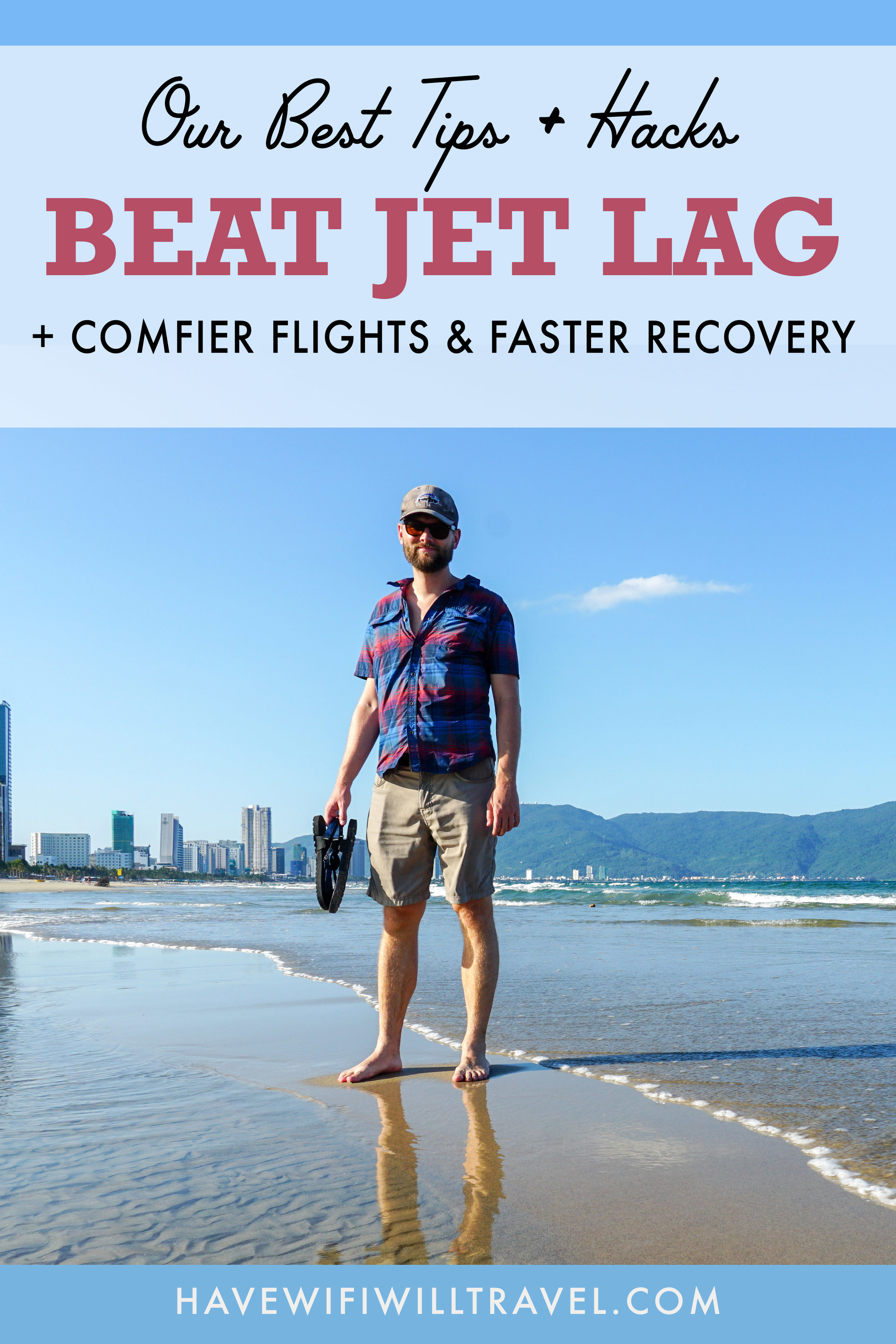Jet Lag Hacks & Tricks: Feel Better After a Long Flight
Jet Lag is easily one of the biggest downsides of international travel. Besides being uncomfortable, it wastes valuable vacation time, causing sleep disturbances and brain fog. While there isn’t one magic pill and it’s likely to affect everyone a little differently, you can mostly avoid jet lag if you play your cards right. We’ve discovered several jet lag hacks worth trying on your next overseas trip.
BEFORE
Timing Helps:
If possible, select a flight that allows early evening arrival and stay up until 10 p.m. local time. If you must sleep during the day, take a short nap in the early afternoon, but no longer than two hours. Set an alarm to be sure not to oversleep.
Anticipate the time change for trips by getting up and going to bed earlier several days prior to Before takeoff:
Aim for at least 7 hours the night before takeoff
Going to bed at least one hour early a few days before takeoff when flying east
Going to bed at least one hour later a few days before takeoff when flying west
For longer flights, such as North America to Asia:
If you are landing in the morning sleep during the second half of your flight
If you are landing in the evening, sleep during the first half of your flight.
Stay well rested:
Prior to your flight, avoid sleep disturbances or staying up all night. Losing excessive sleep leading up to a long flight may help you sleep better on the flight, but it’s more likely to make your jet lag much worse.
Seeing the sunrise on my first morning in Bali was one of the perks of jet lag.
DURING
Make your flight more comfortable:
A quality eye mask and a neck pillow do wonders for sleeping more soundly. We both wear this eye mask and this neck pillow is pretty amazing. Wear loose comfortable clothing and dress in layers.
Hanging out in a noisy environment, such as the cabin of an aircraft, has been shown to trigger your stress response and increase cortisol. Consider wearing earplugs or noise-reducing headphones – especially during long flights–to lower your stress response. Jim won’t travel without his Bose Headphones.
If swelling and leg pain are common issues for you, try wearing compression socks on long flights. Though I have yet to try it, I suffer from leg pain on long flights so I will be testing these on my next flight in April.
Get up and move around.
Avoid sitting still for more than 2-3 hours at a time. I will often get up every 1-2 hours, walking up and down the aisles and stretch at the back of the plane near the bathrooms. I will also do stretches in my seat. Low air pressure, constricted movement, and dehydration increase your chances of discomfort or even more serious problems like DVT. I always pick aisle seats so I can get up and move around. Jim picks window seats. Often, when our flight is not fully booked, we end up with an empty middle seat.
Eat & drink healthy
Stay hydrated!
Starting a few days before your flight, drink loads of water. During the flight, we bring our reusable water bottles and will refill it 2-3 times over the course of the flight. We’ve found that if we ask the flight attendants, they are happy to do it. It beats using tiny plastic cups. We tend to drink coconut water in the days leading up to the flight and use electrolyte tablets in our water during the flight. I LOVE these which have electrolytes and immunity enhancers without sugar or crappy artificial ingredients, to both stay hydrated AND minimize the chance of picking up an unwanted bug on the plane.
Limit Booze & Caffeine
Avoid excessive (more than 1-2 small drinks) alcohol or caffeine, especially during the later hours of the day, a few days before and during travel times. Alcohol dehydrates and interrupts deep sleep while caffeine messes with your circadian clock.
Watch what you eat
Eat healthy, fresh meals & snacks such as hearty salads, sushi, veggie-heavy meals, green smoothies, nuts, bone broth soups, etc. Avoid sugar and fried foods. Flying is rough on the immune system and tummy, so do your body a favor and feed it well. Resist the temptation to consume soft drinks, juice or alcoholic beverages.
Try intermittent fasting
A 13-hour flight may be a perfect opportunity to fast (consume nothing but water). This may even help your body adjust to your new time zone faster. A 2002 study with the National Guard showed that those who used fasting (14-24 hours long) experienced less jet lag than those who didn’t. Break your fast with a large meal in line with meal times at your new destination. The Point’s Guy has a great post about this.
If this is tough for you, be sure to eat in the pattern of your destination eat times–eat 3 meals at the breakfast/lunch/dinner times of your final destination. Your circadian clock is regulated both by sleep and meal times.
Supplements may help
Magnesium Glycinate.
Magnesium is not only a crucial nutrient for general wellbeing, but it’s known as the relaxation vitamin. Ensuring your body has enough magnesium may help you feel more relaxed on your flight and during your travels. Take it when boarding the plane. I take this one regularly, not just when flying and it can help you feel more relaxed at night.
Vitamin C & Zinc
Take Vitamin C and Zinc it to boost your immune system and avoid catching anything on the flight. The hydration tablets by Nuun contain vitamins along with other good stuff like elderberry and echinacea, and will also help you stay hydrated, which is crucial when flying.
*Take advantage of long-layovers. If possible: take a long walk, a nap, a massage and eat a healthy meal during your destination times. Avoid bright light during night time at your light blocking glasses help.
AFTER
Get Outside!
Exercise! Get out and move your body in the days after arriving. Try to do so in the morning, but any time during daylight hours can help reduce the amount of time you feel jet lag.
Try “grounding” or “earthing.” The simple act of walking barefoot on the earth can have notable effects on your mental and physical health, especially in regards to the adverse effects of intercontinental travel. I’ll admit this sounded wacky when I first read about it, but I’m much more convinced after trying for myself. Think about how good you feel after walking barefoot on a beach. Turns out there’s science behind it. Studies have shown that grounding can balance stress hormones, and improve sleep quality, immune response and more.
“Mounting evidence suggests that the Earth's negative potential can create a stable internal bioelectrical environment for the normal functioning of all body systems. Moreover, oscillations of the intensity of the Earth's potential may be important for setting the biological clocks regulating diurnal body rhythms, such as cortisol secretion” See the full article here
Take that barefoot walk in the morning sun or do yoga in the yard and you’ll be on to something big–I promise! Bulletproof Dave Asprey has been talking about this for years check it out.
Light therapy helps
Try using light to help get your circadian rhythm back in sync. If you travel east, avoid bright light in the morning prior to your flight. When traveling west–avoid sunlight or bright light (especially LED light) before dark for first few days. Try to expose yourself to morning daylight at your destination–even if it’s an overcast day.
Avoid napping on your first day
Avoid indulging in a nap on your first afternoon in your destination country and wait until a reasonable bedtime to go to sleep. Get out and explore your new destination and keep yourself busy. This is easier said than done.
Supplement after you arrive
If I could recommend just one tip for minimizing the effects of jetlag, I’d say this: supplement with melatonin. Melatonin is a hormone found in your body that helps to regulate sleep. When you flip or mess with your circadian clock when changing time zones, Melatonin is affected. Upon arriving at your destination, try to stay up until about 9-10pm, and right before going to sleep pop melatonin. This is by far the best brand I’ve tried.
Get help from an APP
I used the Time Shifter app on my last flight from the US to Vietnam and honestly say it was useful. The app will tell you when to drink coffee, expose yourself to light, nap and go to bed at night based on your trip. Unfortunately, you only get one free trip, after which you must pay $10 a pop. However, this may be worth it if you can’t afford to be affected by jet lag.
For something free, check out Jet Lag Rooster where you can simply log in some information about your upcoming flight and get solid tips based on science to help you beat jet lag.
Am I missing anything?
How do you stay comfortable on long flights? What are your best tips for beating jet lag?
For more tips on healthy living check out our post; The Digital Nomad’s Guide to Staying Healthy
Disclosure: some of the links below are affiliate links. If you purchase a linked item, I will made a commission, at no extra charge to you. As an Amazon Associate, I earn from qualifying purchases.





